Charles E W Bean, Diaries, AWM38 3DRL 606/102/1 - March 1918 - Part 6
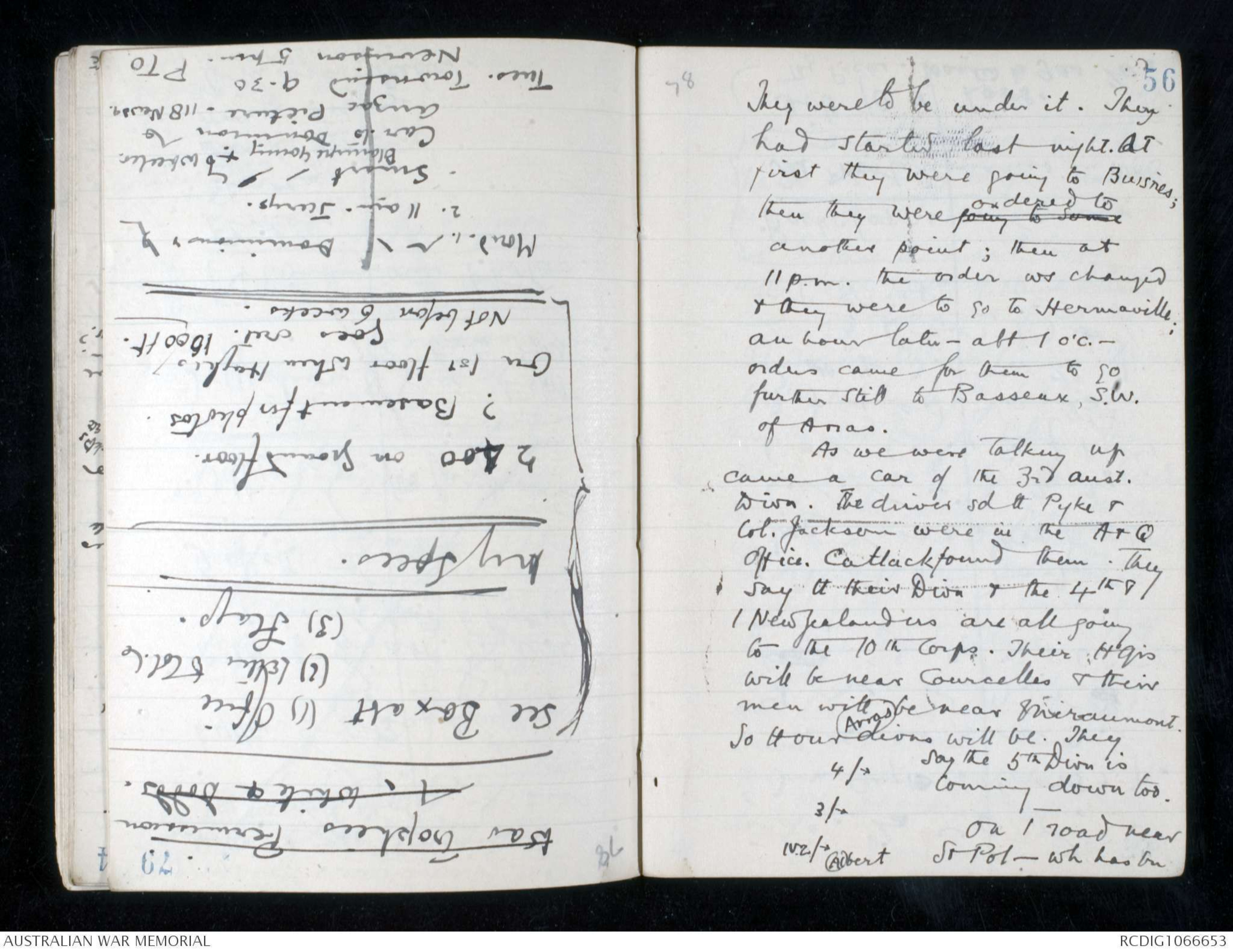
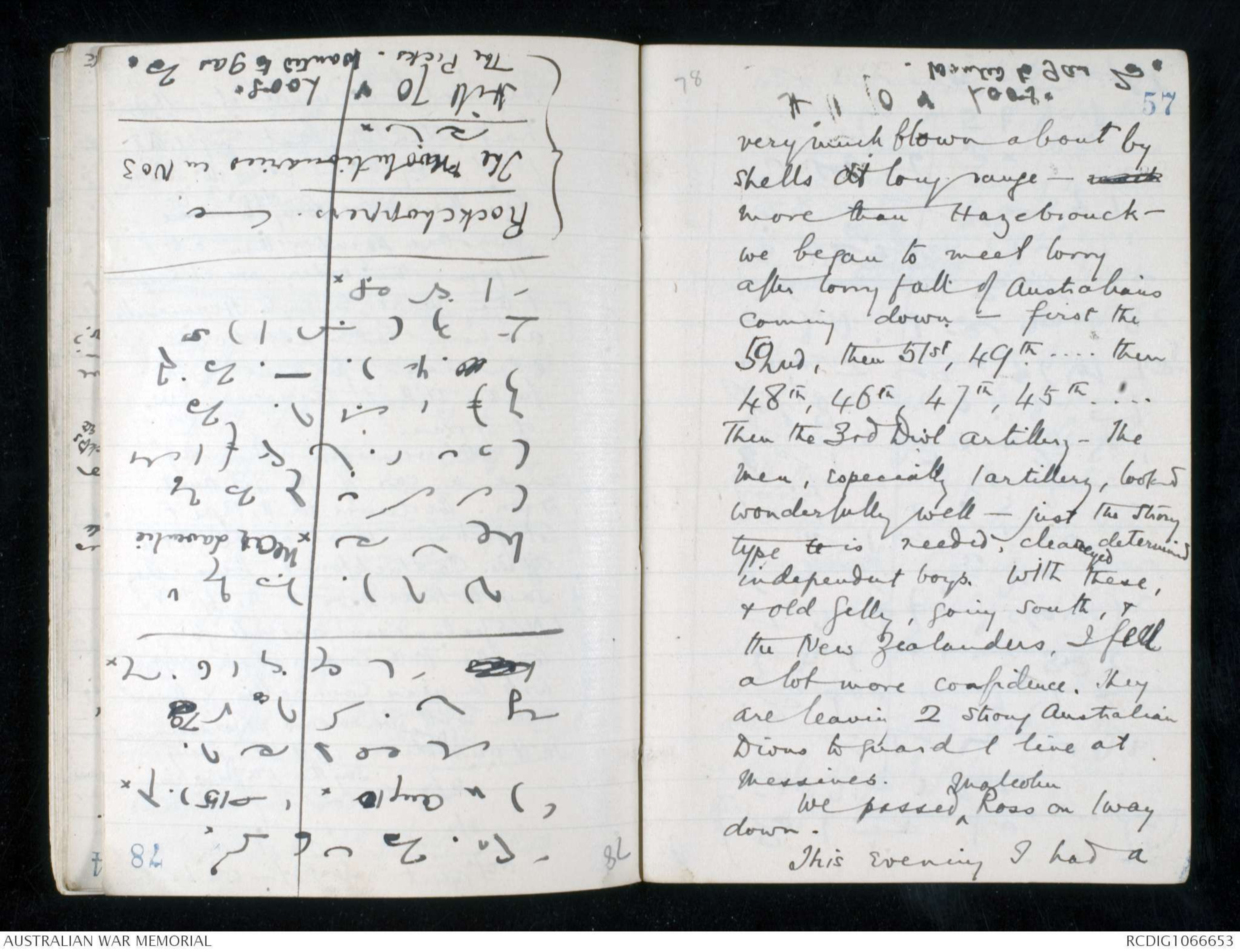
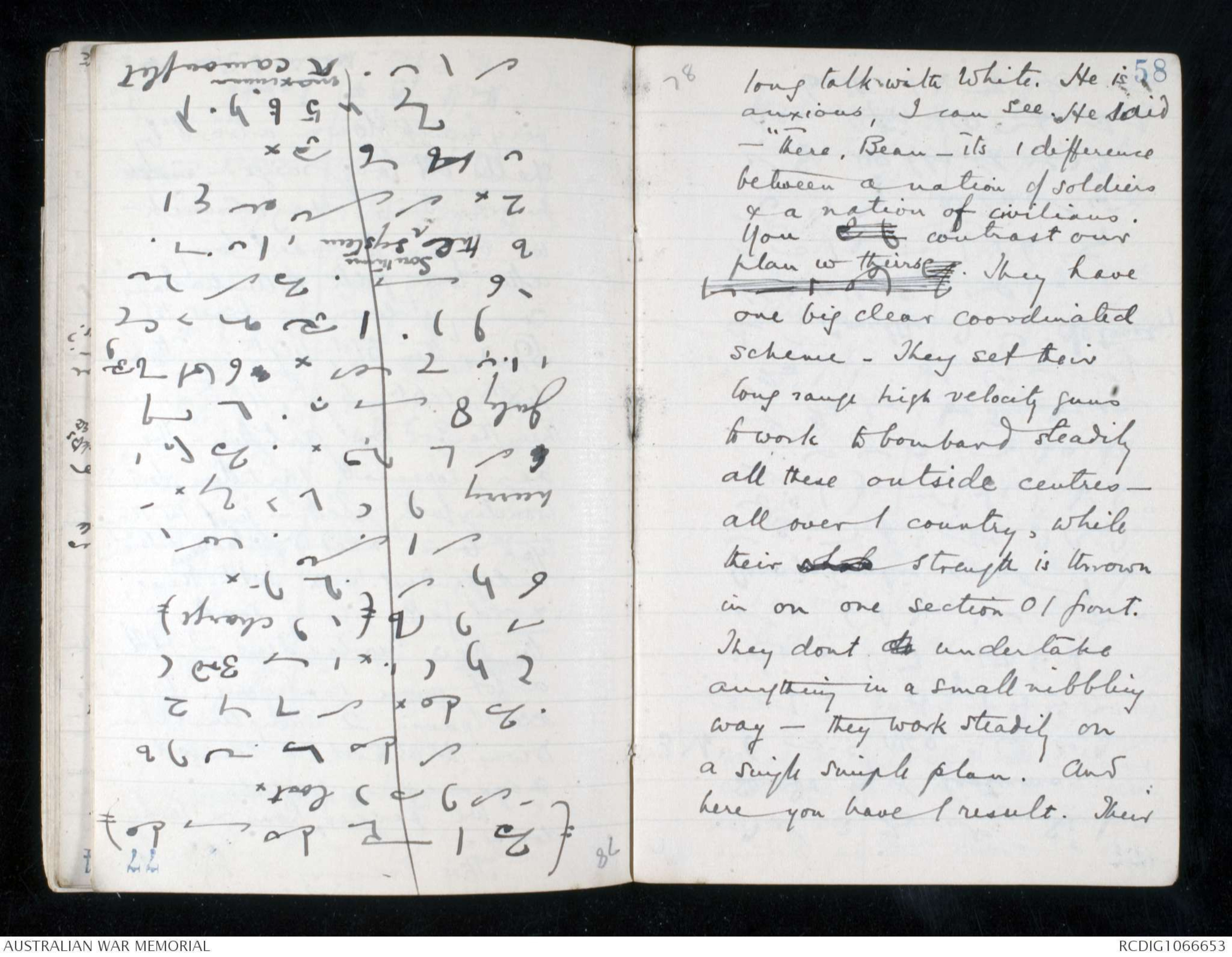
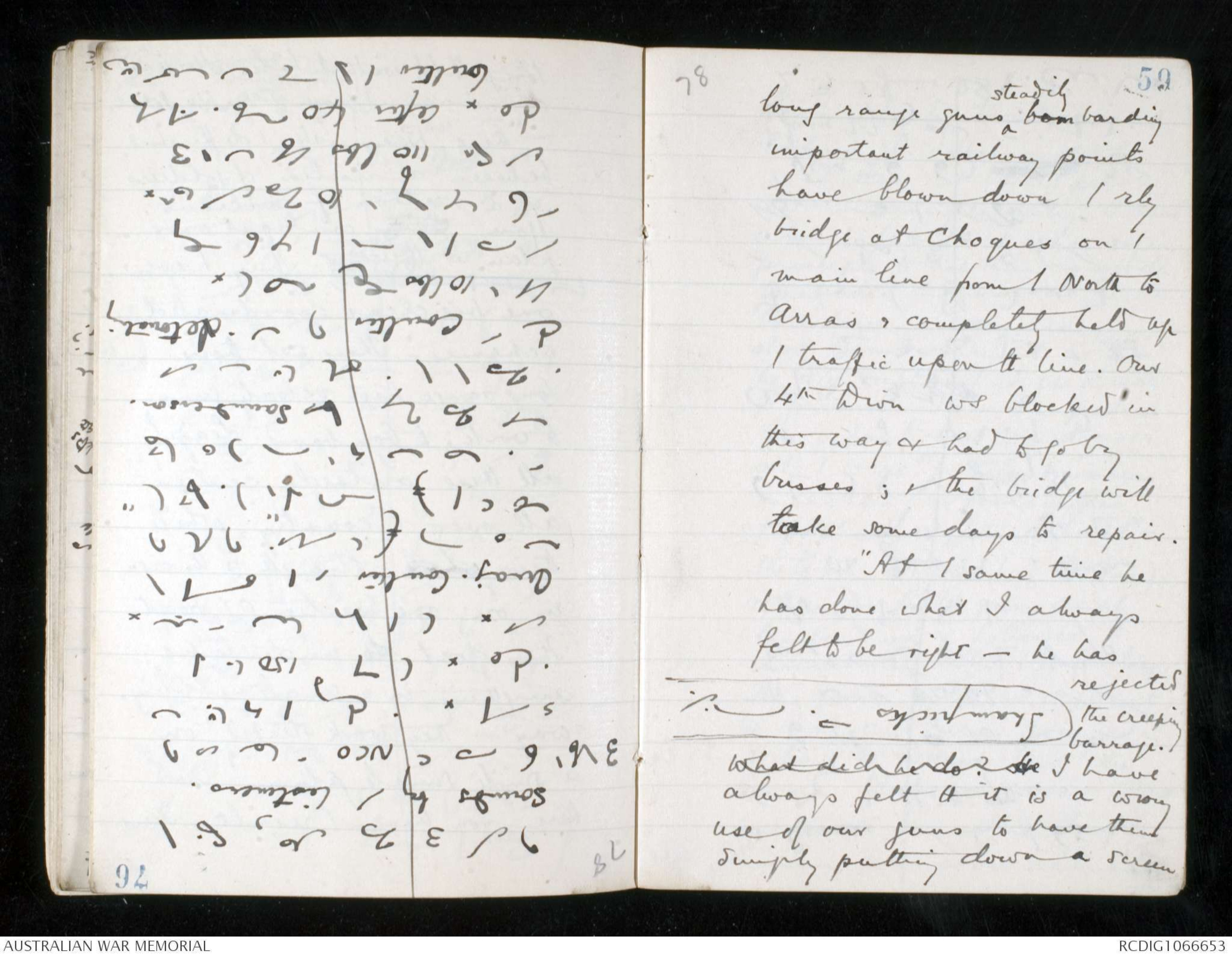
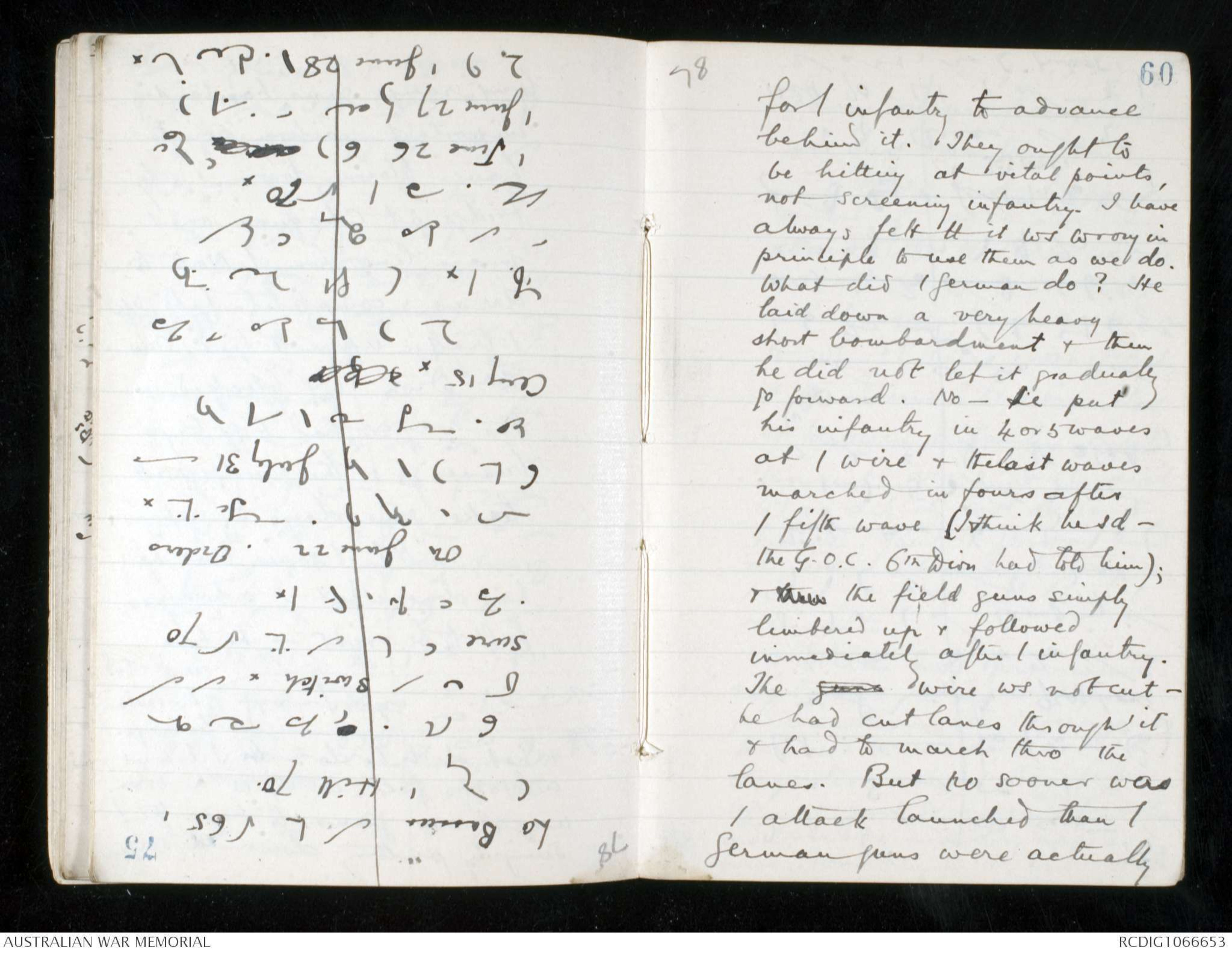
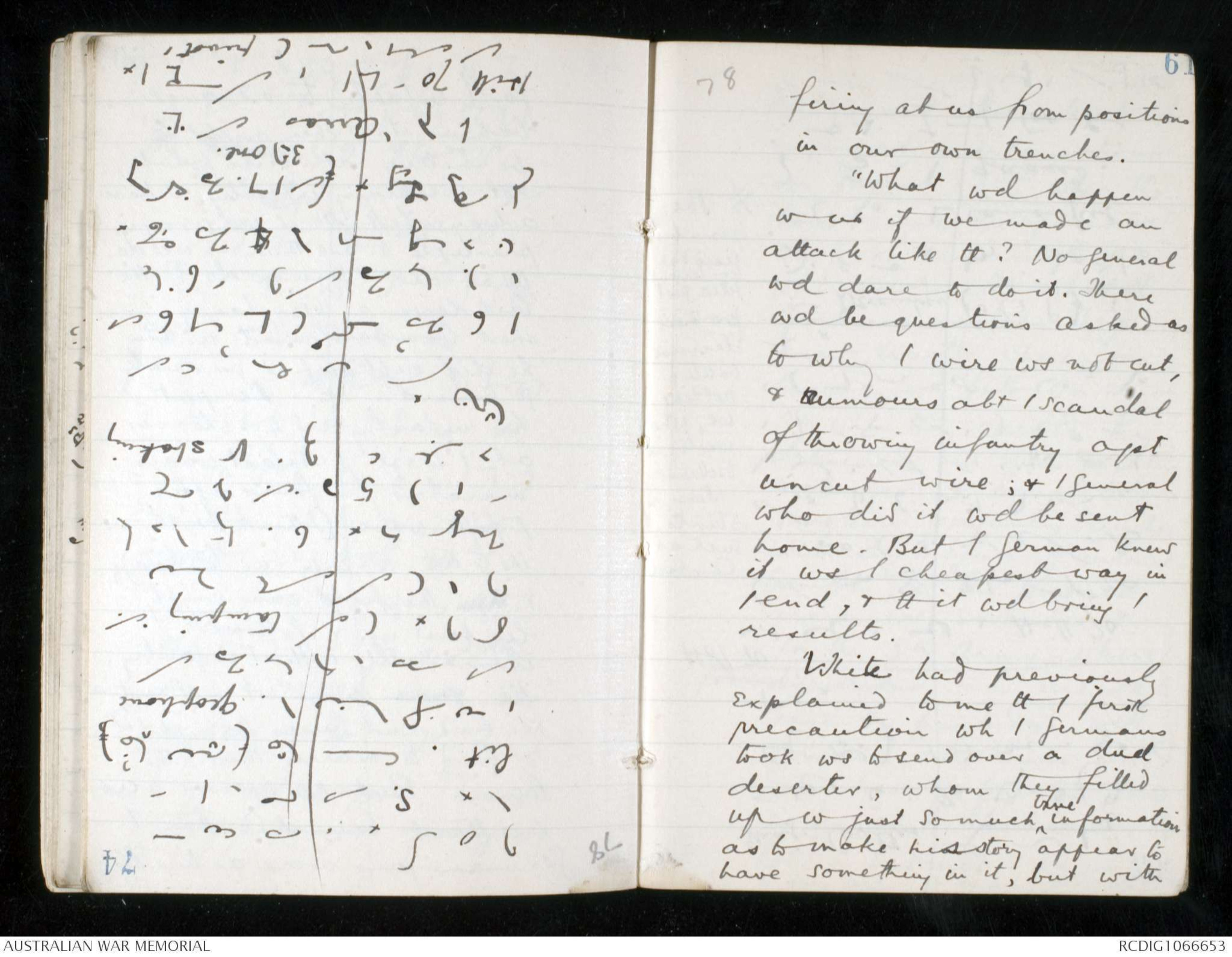
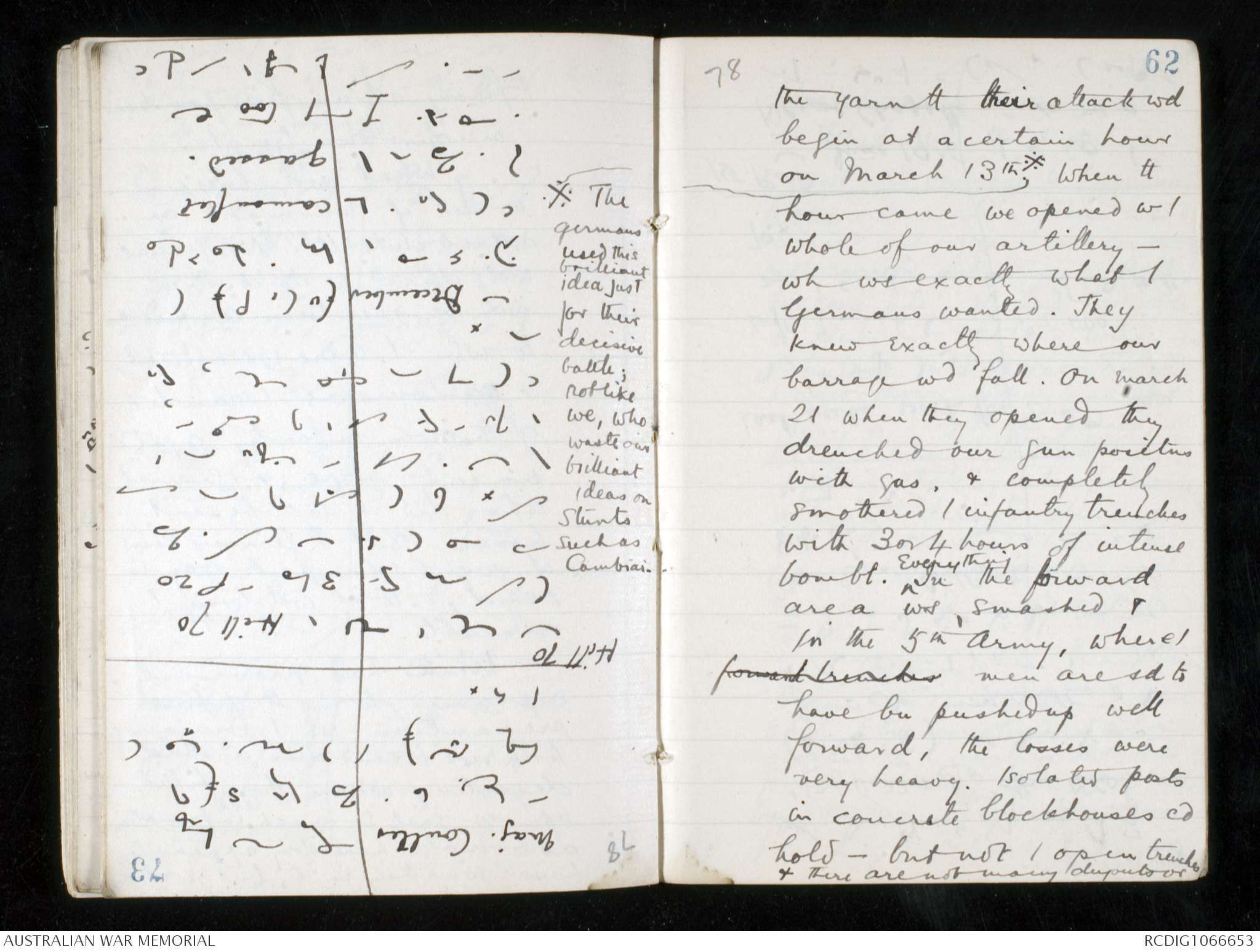
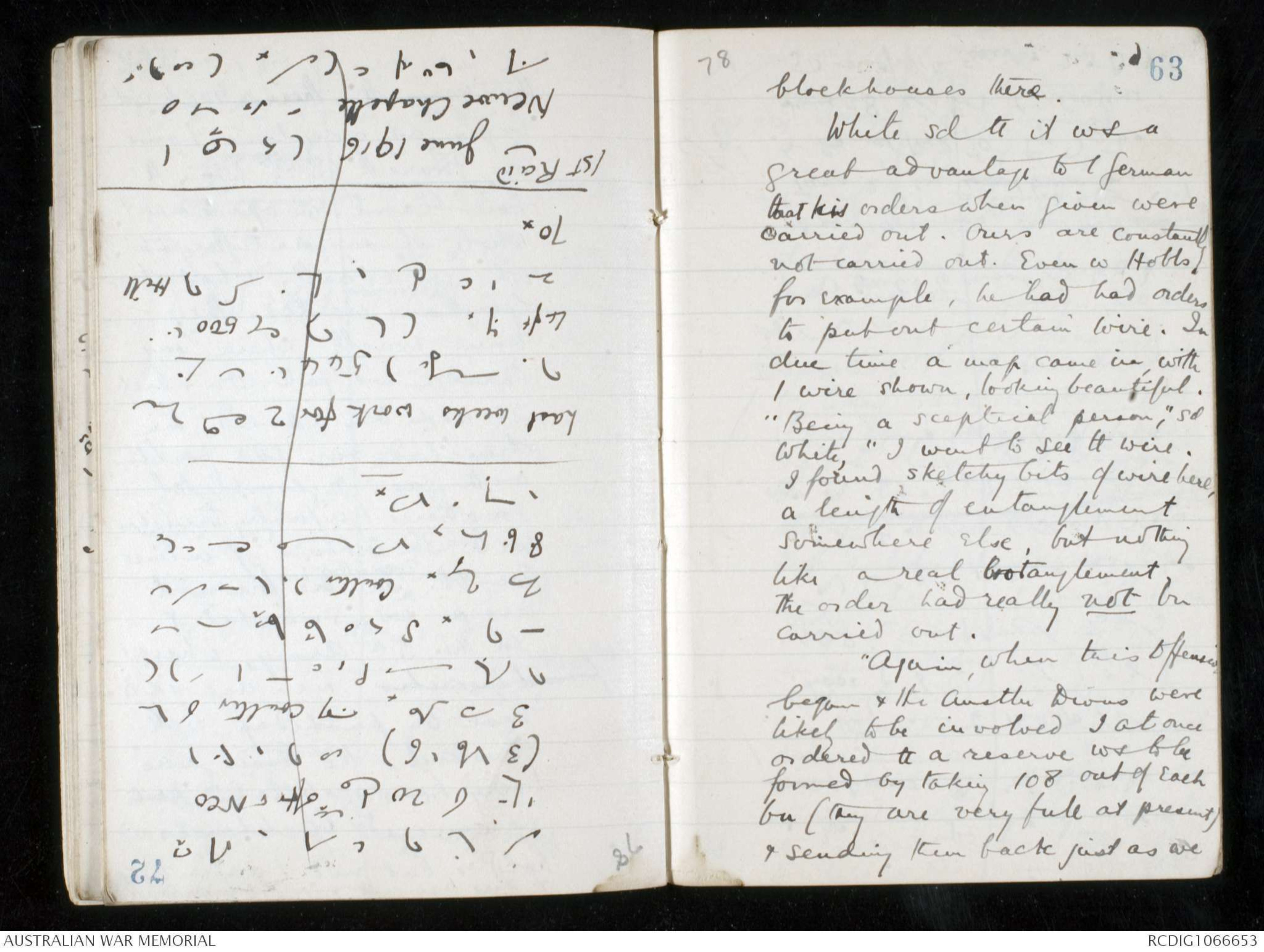
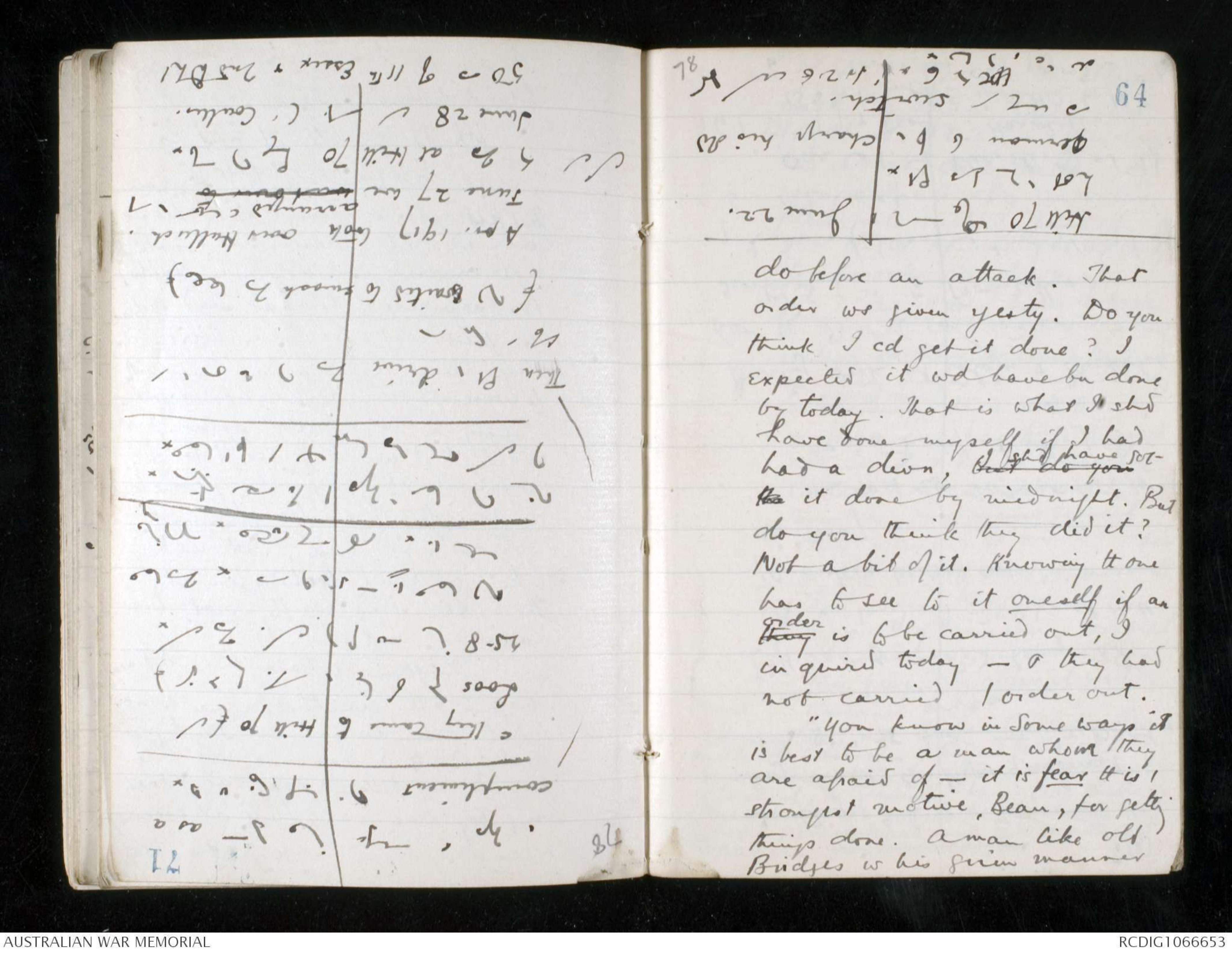
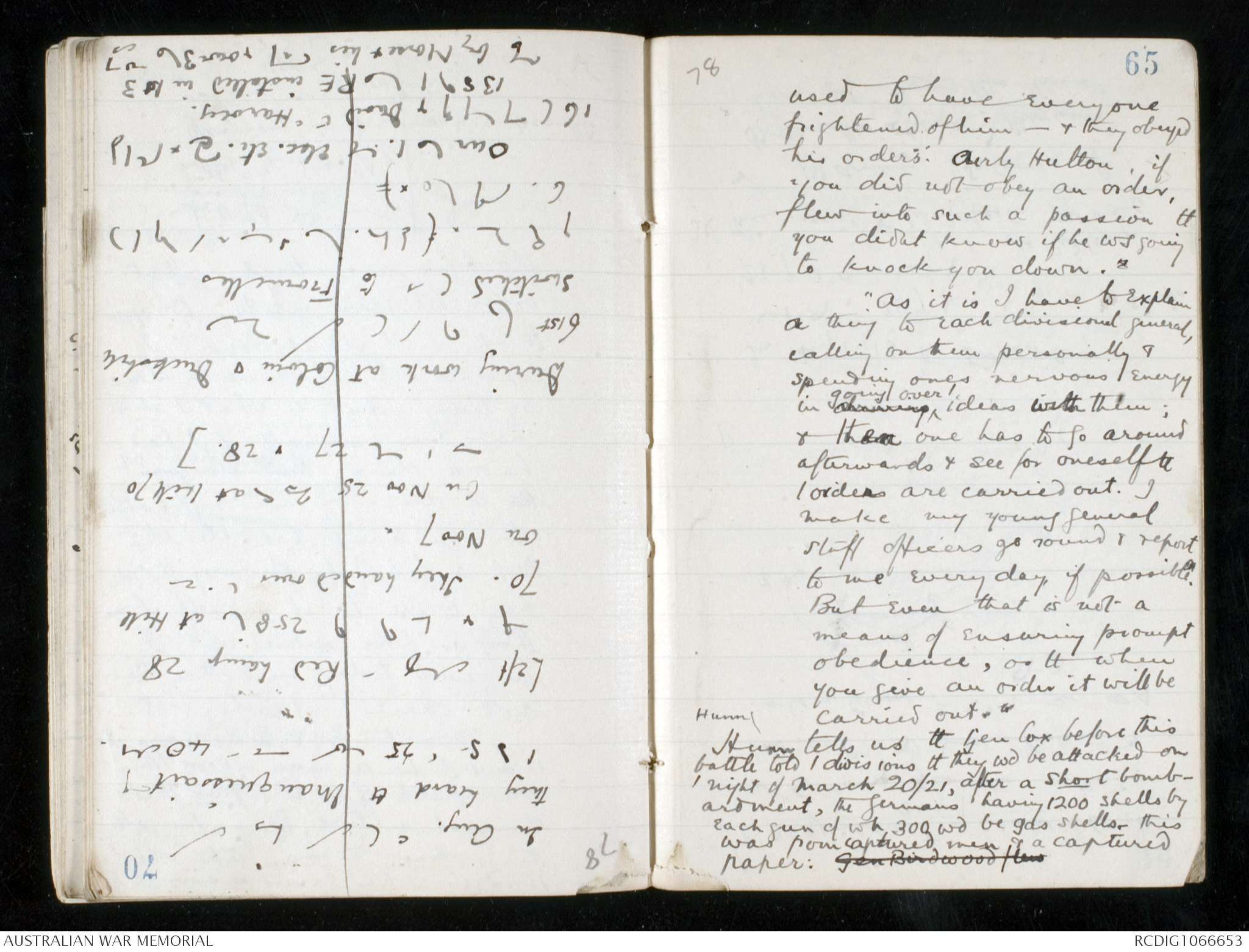
78 79
War Trophies PermissionWrite to White & Dodds.
See Box abt (1) office
(2) Letter to Col. office
(3) Flags.
My Specs.
2 400 on Ground floor.
? Basement for photos.
On 1st floor when Hughes
goes out. 1600 ft.
Not before 6 weeks.
Mond. 1. [Shorthand] Dominions & [Shorthand]
2. 11 a.m. Jurys.
Smart [Shorthand}
Blamyre Young & Wheeler.
Car to Dominion [shorthand]
Anzac Picture - 118 News
Tues. Townsend 9.30
Nevison 5 pm. PTO
78 56
They were to be under it. They
had started last night. At
first they were going to Buisnes;
then they were going to some ordered to
another point; then at
11 p.m. the order ws changed
& they were to go to Hermaville;
an hour later - abt 1 o'c. -
orders came for them to go
further still to Basseux, S.W.
of Arras.
As we were talking up
came a car of the 3rd Aust.
Divn. The driver sd tt Pyke &
Col. Jackson were in the A & Q
Office. Cutlack found them. They
say tt their Divn & the 4th &
/ New Zealanders are all going
to the 10th Corps. Their Hqrs
will be near Courcelles & their
men will be near Miraumont
So tt our (Arras) divns will be. They
Diagram - see original document
say the 5th Divn is
coming down too.
on / road near
St Pol - wh has bn
78 78
and blew the Germans in these galleries.
That was about Aug 10. On August 15 was the battle.
We have since been mining from the
Canadians company a rally from x hill xx 70kms and have nearly completed it within a month.
British number was to remain strictly on the
defensive in mining. Near Lavenlie
though we were under both German trenches
They would not let the company blow (it wanted
to do so) but waited for the Germans.xx The idea was give the Germans a terrible
shock so that they came at us xx
and it completely succeeded.
{Rockchoppers. Quicksand.
{The revolutionaries in No 3
{mining company.
{Hill 70 & Loos.
{The Picks - wanted to gas Germans.
78 57
very much blown about by
shells at long range - which
more than Hazebrouck -
we began to meet lorry
after lorry full of Australians
coming down - first the
52nd, then 51st, 49th . . . . then
48th, 46th, 47th, 45th . . . .
Then the 3rd Divl artillery - The
men, especially / artillery, looked
wonderfully well - just the strong
type tt is needed, clear-eyed determined
independent boys. With these,
& old Gelly, going south, &
the New Zealanders, I feel
a lot more confidence. They
are leaving 2 strong Australian
Divns to guard / line at
Messines.
We passed ^ Malcolm Ross on / way
down.
This evening I had a
78 77
(Germans had counterattacked at once - twice)
- and one other man was lost.
We at once began going over towards
the German tunnels. We got into 2
of them before they did. But in the 3rd they
reached their loads (to their charge)
just before we broke through.
We had warned the infantry to
hurry over that part of the trench. Andxx we took precautions. The Germans blew on
July 8 - made a big crater
but did not kill anyone. x This finished active mining.
There was a large mining system to the north
of this - the Germans were working
towards the ^ Southern system but had not connected the
2. We were not certain that they had
any charges in these mines.
Accordingly about 5 days before the battle
we put in a ^ maximum camouflet.
78
58
long talk with White. He is
anxious, I can see. He said
- "There, Bean - its / difference
between a nation of soldiers
& a nation of civilians.
You xxxx xxxx contrast ourtime can tell who is our civilian plan w theirs. They have
one big clear coordinated
scheme - They set their
long range high velocity guns
to work to bombard steadily
all these outside centres -
all over / country, while
their shaxx strength is thrown
in on one section o / front.
They dont do undertake
anything in a small nibbling
way - they work steadily on
a single simple plan. And
here you have / result. Their
78
76
There were 3 German shafts, placed by
sounds by our listeners.
3 parties of 6 men with NCO and officer went over
with the raid. The tunnellers had heard fighting in
the tunnels. They got 150 ft down
one. They had bomb [shorthand] and [shorthand].
Maj. Coulter who had hurried up
in his car (after returning from leave from
England that day) came down "to see the boys off"
and the next thing heard of him was his voice
in the German trench behind Sanderson.
The Germans put up a heavy fight in one
tunnel and Coulter threw in a detonating
charge of 10 lbs explosive amongst them.
Our men had to be kept out until this exploded
and then only bodies of 10 Germans were found.
We blew 110 lbs charges in all 3
tunnels. After 40 minutes the raid retired
Coulter had been killed in infantry fighting
78
59
long range guns ^ steadily bombarding
important railway points
have blown down / rly
bridge at Choques on /
main line from / North to
Arras & completely held up
/ traffic upon tt line. Our
4th Divn was blocked in
this way & had to go by
busses; but the bridge will
take some days to repair.
"At / same time he
has done what I always
felt to be right - he has
rejected
the creeping
barrage.
[*Shampicks gave the matter away*]
What did he do? He I have
always felt tt it is a wrong
use of our guns to have them
simply putting down a screen
78
75
La Bassee. We took hill 65 but
they buffeted on Hill 70.
This left an xx old German mining system
still under our switch. We were
sure that if we attacked hill 70
the Germans would try to blow it.
On June 22 the Orders
came to prepare for a Canadian attack.
This attack was to be before July 31 -
afterwards the Canadians could not be ready before
Aug 15. So it was a
Work was begun at once and the Germans
noticed it. They started working actively
and we at once suspected that they were
charging the mines at hill 70.
On June 26 this was xxxx that obvious
On June 27 it was certain and a raid was
worked there on June 28 by the tunneling company.
78
60
for / infantry to advance
behind it. They ought to
be hitting at vital points,
not screening infantry. I have
always felt tt it ws wrong in
principle to use them as we do.
What did / German do? He
laid down a very heavy
short bombardment & then
he did not let it gradually
go forward. No - he put
his infantry in 4 or 5 waves
at / wire & the last waves
marched in fours after
/ fifth wave (I think he sd -
the G.O.C. 6th Divn had told him);
& thru the field guns simply
limbered up & followed
immediately after / infantry.
The guns wire ws not cut -
he had cut lanes through it
& had to march thro the
lanes. But no sooner was
/ attack launched than /
German guns were actually
78
74
their first shell. The men would not give
up. S. ran across to it and
lit the quick fuse (lightning fuse?)
but could not resist picking up the geophone
one moment to hear if the Germans were
still there. They were tamping away
for all they were worth working
tremendously hard. Then the door up to the top
and he was 5 yards away from the mouth
of the shaft when there was a dull shaking
vibration.
Later, in September, when we
had these German galleries they dug into this one
to see if the Germans were there and within a few
feet of the entrance came upon 54 German skulls.
Death must have been instantaneous. (We did get the Germans completely beaten
3 to their one.
At the battle of Arras we attacked
Hill 70 and took it but were counterattacked out.
We wanted to make them pivot and
78
61
firing at us from positions
in our own trenches.
"What wd happen
w us if we made an
attack like tt? No general
wd dare to do it. There
wd be questions asked as
to why / wire ws not cut,
& numerous abt / scandal
of throwing infantry agst
uncut wire; & / general
who did it wd be sent
home. But / German knew
it ws / cheapest way in
/ end, & tt it wd bring /
results.
White had previously
explained to me tt / first
precaution wh / Germans
took ws to send over a dud
deserter, whom they filled
up w just so much ^ true information
as to make his story appear to
have something in it, but with
78
73
Maj. Coulter explored many dugouts
and finally found a German power plant (for
electric lighting) which was making the noise
they had heard.
Hill 70
In November on going to Hill 70
they were immediately blown 3 times and lost 20
men because they didn't know where the Germans
were. Then they waited for him -
put in a charge and enticed him on
to try and blow one of their quarries and,
when they got him close enough, blew
him.
In December (I think he said) they
arranged with the guns to bombard the openings of the tunnels
that they blew a big camouflet
so that the Germans may be gassed.
The guns opened 1 minute too soon
and cut the wire at the entrance of our tunnel with
78
62
The yarn tt their attack wd
begin at a certain hour
on March 13th ^ X
[* X The
Germans
used this
brilliant
idea just
for their
decisive
battle;
not like
we, who
waste our
brilliant
ideas on
stunts
such as
Cambrai*]
When tt
hour came we opened w /
whole of our artillery -
wh ws exactly what /
Germans wanted. They
knew exactly where our
barrage wd fall. On March
21 when they opened they
drenched our gun positns
with gas, & completely
smothered / infantry trenches
with 3 or 4 hours of intense
bombt. ^ Everything in the forward
area ws smashed &
in the 5th Army, where /forward trenches men are sd to
have bn pushed up well
forward, the losses were
very heavy. Isolated posts
in concrete blockhouses cd
hold - but not / open trenches
& there are not many dugouts or
78
72
were back from that raid to hold ground
on top while 20 tunnels including offr & NCO
(3 parties of 6) went over to blow up
3 mine shafts. Major Coulter just back
from leave - said he would go out and see them
go over. S heard his voice behind him in the
German trenches. Coulter was to have gone away in
8 days time to the battalion commanders school with view
to getting a battalion.
Last weeks work for 2 sections working
for the Canadians was 544 feet in [shorthand]
4 ft wide. They have very nearly 500 feet a
week on that tunnel to dig a rally from Hill
70.
1st Raid
In June 1916 they heard noises at
Neuve Chapelle and joined in the first
raid to find out what they were. They went over and
78
63
blockhouses there.
White sd tt it ws a
great advantage to / German
that his orders when given were
carried out. Ours are constantly
not carried out. Even w Hobbs,
for example, he had had orders
to put out certain wire. In
due time a map came in with
/ wire shown, looking beautiful.
"Being a sceptical person," sd
White, "I want to see tt wire.
I found sketchy bits of wire here,
a length of entanglement
somewhere else, but nothing
like a real entanglement.
The order had really not bn
carried out.
"Again, when this offensive
began & the Austln Divns were
likely to be involved I at once
ordered tt a reserve ws to be
formed by taking 108 out of each
bn (they are very full at present)
& sending them back just as we
78
71
The Australian and Canadian companies been given as a
compliment for a nasty place on the front.
When they came to Hill 70 (where
Loos battle just failed to reach the top of the hill)
258 company could not tell us where the Germans were.
British officers did go down to their men. German officers
never did. Mostly coal miners. Earlier companies better
Prac every officer of Australians had high mining diploma.
There were [shorthand] boards formed notwithstanding which tested all officers.
Then started to drive German over towards some of our
charges and blew him
(British waited to smash German offensives)
Apr. 1917 took over Hulluch.
June 27 we went over to arranged with infantry to raid
where we heard Germans at Hill 70 suddenly very active.
June 28 we raided them with Coulter.
50 men of 11th Essex & 2nd DLI
78
64
[*Hill 70 instructions came on June 22.
Lot of work at once started.
German then decided to charge his old
mines underneath our switch and
IDC heard this. On June 26 we were absolutely
certain of what he was doing.*]
do before an attack. That
order ws given yesty. Do you
think I cd get it done? I
expected it wd have bn done
by today. That is what I shd
have done myself if I had
had a divn, next do you I shd have gotthe it done by midnight. But
do you think they did it?
Not a bit of it. Knowing tt one
has to see to it oneself if anthing order is to be carried out, I
inquired today - & they had
not carried / order out.
"You know in some ways it
is best to be a man whom they
are afraid of - it is fear tt is /
strongest motive, Bean, for getting
things done. A man like old
Bridges w his firm manner
78
70
In Aug. when they were taken where
they heard tt Mauquissait crater
had been blown with 25 infantry killed and 40 wounded.
Left Winchester and Red Lamp 28
October. Took over from 258 company at Hill
70. They handed over after a week
on Nov 7.
On Nov 25 Germans blow at Hill 70
again on Nov 27 & 28.]
During work at Colvin & Ducksbill
61st division from which they were working
switched them round to Fromelles
to do special work. (At the time the company didn't know how much better it was
than the larger companies.)
Our companies had the only elec. etc. machinery. Left it at first
but then they got into water & David fought with Harvey.
13 planned for it being RE installed in 2 or 3
months by Morse & his crowd & our 3 companies could not get one.
78
65
used to have everyone
frightened of him - & they obeyed
his orders: Only Hutton, if
you did not obey an order,
flew into such a passion tt
you didnt know if he ws going
to knock you down. "
"As it is I have to explain
a thing to each divisional general,
calling on them personally &
spending ones nervous energy
in showing ^ going over / ideas with them;
& then one has to go around
afterwards & see for oneself tt
/ orders are carried out. I
make my young general
staff officers go round & report
to me every day, if possible.
But even that is not a
means of ensuring prompt
obedience, or tt when
you give an order it will be
carried out."
Hunn\
Hunn tells us tt Gen Cox before this
battle told / divisions tt they wd be attacked on
/ night of March 20/21, after a short bombardment,
the Germans having 1200 shells by
each gun of wh 300 wd be gas shells - this
was from captured men & a captured
paper: Gen Birdwood flew
 Deb Parkinson
Deb ParkinsonThis transcription item is now locked to you for editing. To release the lock either Save your changes or Cancel.
This lock will be automatically released after 60 minutes of inactivity.